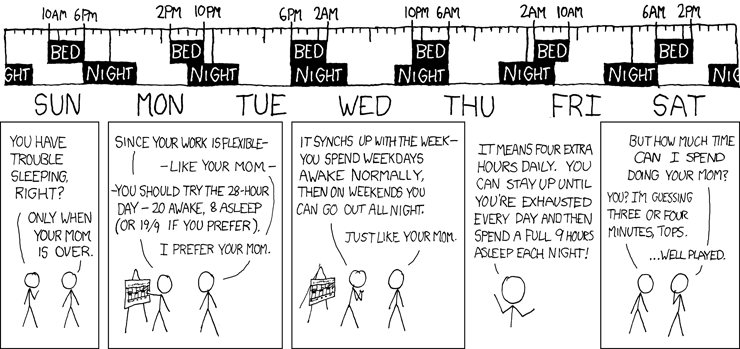 Twenty Eight Hour Day
Twenty Eight Hour Day Twenty Eight Hour Day
Twenty Eight Hour Day

From SleepToWork
I heard of hackers at school staying up an extra 4 hours each night, so that they would only sleep 6 times a week. They were thus living a 28-hour day. The trick was to schedule the phases so that you'd be awake for certain key classes or social events. -- EdPoor
It's just not possible to keep it up in the long run. I realize that, for medical reasons, this sort of thing is easier for other people than for me, but even so nobody can really keep themselves at top form doing this.
This was popular at MIT during the 60s (see StephenLevy?'s HackersBook?).
Humans have a circadian rhythm of around 24.5 hours. If given no external cues (such as a light cycle or social cues), humans will "free run" to their natural cycle (which can vary). Some people could possibly maintain the longer schedule described above, but to the majority of people, it would be like living in constant jet lag. There is some evidence that as people get older, the rhythm shortens, and disruptions are more stressful. So lifestyles that work when someone is 20 may not work at 40 or 60.
I did this unintentionally during exam preparations. It was not exactly 28 hours a day, but rather about 6 "days" in a week for about 2-3 weeks. I was mostly alone and sat on my computer and over my books. I'm not sure if it had any positive or negative effects, just that it occurred by itself - pobably due to the stress. I cannot recommend it, though I remember it as an episode of strength and success.
Something somewhat similar happened when I wrote the code for my diploma thesis: I got really into the MentalStateCalledFlow and just couldn't stop. I put in two 50-hour sprints interrupted by a 20 hours or very deep sleep. It wasn't really needed (I had enough time left and it wasn't stressful), but just happened.
In both of these cases I really got out of sync with daytime and it took a while to readjust. I guess it's like JetLag, which I didn't have yet (not having flown far enough).
See also ThirtySixHourDay.
 EditText of this page
(last edited July 7, 2013)
or FindPage with title or text search
EditText of this page
(last edited July 7, 2013)
or FindPage with title or text search